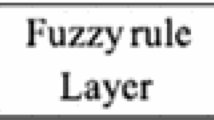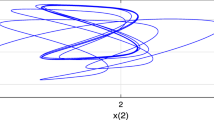Abstract
Financial systems are known to have irregular and erratic fluctuations due to diverse influences and often result in economic crisis and huge financial losses. Recent models of financial systems show that they behave chaotically and have long range memory dependence. Mitigating these undesirable chaotic natures of financial systems by appropriate control policies is important in order to reduce investment risks and improve economic performance. In this paper, a fractional order fuzzy control policy is employed to suppress the chaotic dynamics of a representative chaotic fractional order financial system. An intelligent Regrouping Particle Swarm Optimization (Reg-PSO) is used to design the numeric weights of the control policy and the methodology is demonstrated by credible simulations. The designed fractional fuzzy control policies are shown to work well with respect to conventional fuzzy control policies in the presence of persistent and anti-persistent noise, which can be due to additional extraneous influences on the system.











Similar content being viewed by others
References
Xu, Z., Genccay, R.: Scaling, self-similarity and multifractality in FX markets. Physica A, Stat. Mech. Appl. 323, 578–590 (2003)
Cont, R.: Long range dependence in financial markets. In: Lutton, E., Vehel, J. (eds.) Fractals in Engineering, pp. 159–180. Springer, Berlin (2005)
Zhang, Q., Ma, J.H.: Analysis on Hopf bifurcation and complexity of one kind financial system. Appl. Mech. Mater. 48, 813–816 (2011)
Gao, Q., Ma, J.: Chaos and Hopf bifurcation of a finance system. Nonlinear Dyn. 58(1), 209–216 (2009)
Ma, J., Chen, Y.: Study for the bifurcation topological structure and the global complicated character of a kind of nonlinear finance system (II). Appl. Math. Mech. 22(12), 1375–1382 (2001)
Puu, T.: Chaos in duopoly pricing. Chaos Solitons Fractals 1(6), 573–581 (1991)
Guegan, D.: Chaos in economics and finance. Anal. Control Chaotic Syst. 1(1), 1 (2006)
Chian, A.C.L.: Nonlinear dynamics and chaos in macroeconomics. Int. J. Theor. Appl. Finance 3(3), 601 (2000)
Yu, H., Cai, G., Li, Y.: Dynamic analysis and control of a new hyperchaotic finance system. In: Nonlinear Dynamics, pp. 1–12 (2012)
Sewell, M.: Characterization of financial time series. UCL Department of Computer Science, Research Note RN/11/01, pp. 1–35 (2011)
Das, S.: Functional Fractional Calculus. Springer, Berlin (2011)
Sabatier, J., Agrawal, O.P., Machado, J.: Advances in Fractional Calculus: Theoretical Developments and Applications in Physics and Engineering. Springer, Berlin (2007)
Oldham, K.B., Spanier, J.: The Fractional Calculus: Theory and Applications of Differentiation and Integration to Arbitrary Order, vol. 111. Elsevier, Amsterdam (1974)
Miller, K.S., Ross, B.: An introduction to the fractional calculus and fractional differential equations (1993)
Vilela Mendes, R.: A fractional calculus interpretation of the fractional volatility model. Nonlinear Dyn. 55(4), 395–399 (2009)
Elliott, R.J., Van Der Hoek, J.: A general fractional white noise theory and applications to finance. Math. Finance 13(2), 301–330 (2003)
Hu, Y., Oksendal, B.: Fractional white noise calculus and applications to finance. Infin. Dimens. Anal. Quantum Probab. Relat. Top. 6, 1–32 (2003)
Scalas, E., Gorenflo, R., Mainardi, F.: Fractional calculus and continuous-time finance. Physica A, Stat. Mech. Appl. 284(1), 376–384 (2000)
Duarte, F.B., Tenreiro Machado, J., Monteiro Duarte, G.: Dynamics of the Dow Jones and the NASDAQ stock indexes. Nonlinear Dyn. 61(4), 691–705 (2010)
Tenreiro Machado, J., Duarte, F.B., Monteiro Duarte, G.: Analysis of financial data series using fractional Fourier transform and multidimensional scaling. Nonlinear Dyn. 65(3), 235–245 (2011)
Fanti, L., Manfredi, P.: Chaotic business cycles and fiscal policy: an IS-LM model with distributed tax collection lags. Chaos Solitons Fractals 32(2), 736–744 (2007)
Helbing, D.: Economic Evolution and Demographic Change (1992)
Wang, Y., Yang, W., Li, K., Hu, F.: Prediction and control of financial crisis based on chaotic system. In: 2010 2nd IEEE International Conference on Information and Financial Engineering (ICIFE), Chongqing, China, 17–19 Sept. 2010, pp. 865–869 (2010). doi:10.1109/ICIFE.2010.5609492
Ott, E., Grebogi, C., Yorke, J.A.: Controlling chaos. Phys. Rev. Lett. 64(11), 1196–1199 (1990)
Pyragas, K.: Continuous control of chaos by self-controlling feedback. Phys. Lett. A 170(6), 421–428 (1992)
Holyst, J.A., Urbanowicz, K.: Chaos control in economical model by time-delayed feedback method. Physica A, Stat. Mech. Appl. 287(3), 587–598 (2000)
Chen, L., Chen, G.: Controlling chaos in an economic model. Physica A, Stat. Mech. Appl. 374(1), 349–358 (2007)
Kopel, M.: Improving the performance of an economic system: controlling chaos. J. Evol. Econ. 7(3), 269–289 (1997)
Kaas, L.: Stabilizing chaos in a dynamic macroeconomic model. J. Econ. Behav. Organ. 33(3–4), 313–332 (1998)
Du, J., Huang, T., Sheng, Z., Zhang, H.: A new method to control chaos in an economic system. Appl. Math. Comput. 217(6), 2370–2380 (2010)
Wang, Z., Huang, X., Shen, H.: Control of an uncertain fractional order economic system via adaptive sliding mode. Neurocomputing 83, 83–88 (2012)
Dadras, S., Momeni, H.R.: Control of a fractional-order economical system via sliding mode. Physica A, Stat. Mech. Appl. 389(12), 2434–2442 (2010)
Chen, W.C.: Nonlinear dynamics and chaos in a fractional-order financial system. Chaos Solitons Fractals 36(5), 1305–1314 (2008)
Antoniou, A., Vorlow, C.E.: Price clustering and discreteness: is there chaos behind the noise? Physica A, Stat. Mech. Appl. 348, 389–403 (2005)
Machado, J.T., Duarte, G.M., Duarte, F.B.: Identifying economic periods and crisis with the multidimensional scaling. Nonlinear Dyn. 63(4), 611–622 (2011)
Biswas, A., Das, S., Abraham, A., Dasgupta, S.: Design of fractional-order PIλDμ controllers with an improved differential evolution. Eng. Appl. Artif. Intell. 22(2), 343–350 (2009)
Pan, I., Das, S., Gupta, A.: Tuning of an optimal fuzzy PID controller with stochastic algorithms for networked control systems with random time delay. ISA Trans. 50(1), 28–36 (2011)
Juang, C.F., Lu, C.M., Lo, C., Wang, C.Y.: Ant colony optimization algorithm for fuzzy controller design and its FPGA implementation. IEEE Trans. Ind. Electron. 55(3), 1453–1462 (2008)
Petrás, I.: Fractional-Order Nonlinear Systems: Modeling, Analysis and Simulation. Springer, Berlin (2011)
Skovránek, T., Podlubny, I., Petrás, I.: Modeling of the national economies in state-space: a fractional calculus approach. Econ. Model. 29(4), 1322–1327 (2012)
Gan, C.: Noise-induced chaos and basin erosion in softening Duffing oscillator. Chaos Solitons Fractals 25(5), 1069–1081 (2005)
Salarieh, H., Alasty, A.: Control of stochastic chaos using sliding mode method. J. Comput. Appl. Math. 225(1), 135–145 (2009)
Lalley, S.P.: Removing the noise from chaos plus noise. In: Mees, A.I. (ed.) Nonlinear Dynamics and Statistics, Proceedings of the Isaac Newton Institute Workshop. Birkhauser, Boston (2000)
Li, N.Q., Pan, W., Yan, L.S., Luo, B., Xu, M.F., Jiang, N.: Parameter estimation for chaotic systems with and without noise using differential evolution-based method. Chin. Phys. B 20, 060502 (2011)
Willinger, W., Taqqu, M.S., Teverovsky, V.: Stock market prices and long-range dependence. Finance Stoch. 3(1), 1–13 (1999)
Manolakis, D.G., Ingle, V.K., Kogon, S.M.: Statistical & adaptive signal processing: spectral estimation, signal modeling, adaptive filtering & array processing (2005)
Bak, P., Tang, C., Wiesenfeld, K.: Self-organized criticality: an explanation of the 1/f noise. Phys. Rev. Lett. 59(4), 381–384 (1987)
Mandelbrot, B.B.: A fast fractional Gaussian noise generator. Water Resour. Res. 7(3), 543–553 (1971)
Koutsoyiannis, D.: The Hurst phenomenon and fractional Gaussian noise made easy. Hydrol. Sci. J. 47(4), 573–595 (2002)
Magin, R., Ortigueira, M.D., Podlubny, I., Trujillo, J.: On the fractional signals and systems. Signal Process. 91(3), 350–371 (2011)
Das, S., Pan, I., Das, S., Gupta, A.: A novel fractional order fuzzy PID controller and its optimal time domain tuning based on integral performance indices. Eng. Appl. Artif. Intell. 25(2), 430–442 (2012)
Abd-Elouahab, M.S., Hamri, N.-E., Wang, J.: Chaos control of a fractional-order financial system. Hindawi Publ. Corp., Math. Probl. Eng. 2010, 270646 (2010). doi:10.1155/2010/270646
Podlubny, I., Petras, I., Vinagre, B.M., O’leary, P., Dorcák, L.: Analogue realizations of fractional-order controllers. Nonlinear Dyn. 29(1), 281–296 (2002)
Chen, Y.Q., Vinagre, B.M., Podlubny, I.: Continued fraction expansion approaches to discretizing fractional order derivatives—an expository review. Nonlinear Dyn. 38(1), 155–170 (2004)
Oustaloup, A., Levron, F., Mathieu, B., Nanot, F.M.: Frequency-band complex noninteger differentiator: characterization and synthesis. IEEE Trans. Circuits Syst. I, Fundam. Theory Appl. 47(1), 25–39 (2000)
Pan, I., Das, S., Gupta, A.: Handling packet dropouts and random delays for unstable delayed processes in NCS by optimal tuning of PIλDμ controllers with evolutionary algorithms. ISA Trans. 50(4), 557–572 (2011)
Das, S., Pan, I., Das, S., Gupta, A.: Master-slave chaos synchronization via optimal fractional order PIλDμ controller with bacterial foraging algorithm. Nonlinear Dyn. 69(4), 2193–2206 (2012)
Kennedy, J., Eberhart, R.: Particle swarm optimization. In: Proceedings of the IEEE International Conference on Neural Networks, The University of Western Australia, Perth, Western Australia, Nov./Dec. 1995, vol. 4, pp. 1942–1948 (1995). doi:10.1109/ICNN.1995.488968
Evers, G.I., Ben Ghalia, M.: Regrouping particle swarm optimization: a new global optimization algorithm with improved performance consistency across benchmarks. In: IEEE International Conference on Systems, Man and Cybernetics, SMC 2009, San Antonio, Texas, USA, 11–14 Oct. 2009, pp. 3901–3908 (2009). doi:10.1109/ICSMC.2009.5346625
Author information
Authors and Affiliations
Corresponding author
Rights and permissions
About this article
Cite this article
Pan, I., Korre, A., Das, S. et al. Chaos suppression in a fractional order financial system using intelligent regrouping PSO based fractional fuzzy control policy in the presence of fractional Gaussian noise. Nonlinear Dyn 70, 2445–2461 (2012). https://doi.org/10.1007/s11071-012-0632-7
Received:
Accepted:
Published:
Issue Date:
DOI: https://doi.org/10.1007/s11071-012-0632-7




